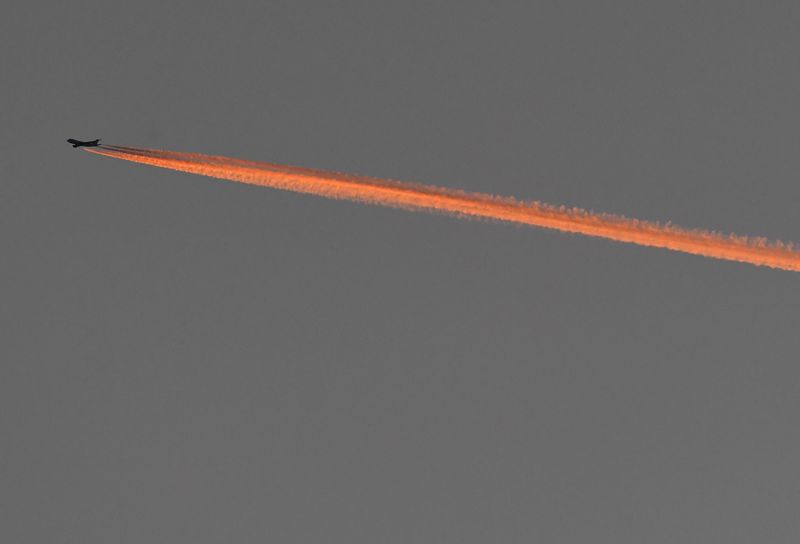By Joanna Plucinska
LONDON (Reuters) - Global airlines are setting up a task force to deal with non-carbon dioxide (CO2) emissions, stepping up efforts to tackle cloudy streaks formed by aircraft known as contrails, an environmental threat that until now has taken a backseat to carbon pollution in the response to global warming.
The move comes as the International Air Transport Association (IATA), representing some 300 major airlines, is preparing to discuss the warming effect of contrails for the first time at its annual meeting in Istanbul next week.
The streaks are formed in moist atmospheric conditions and are made up of frozen ice crystals. While they don't emit CO2, scientists say they can trap radiation and reflect it back down to earth, creating a harmful warming effect.
Starting this year, the task force will coordinate efforts by researchers and airlines to limit the creation of contrails in an effort to encourage the sector to do more, IATA said.
The idea is to "accurately predict conditions favouring the formation of contrails and minimize the risks of increased fuel when avoiding them," an IATA spokesperson said in response to a Reuters query.
But some researchers and environmental groups - supported by companies claiming to be able to help solve the problem - say airlines have done too little to handle the issue.
According to such experts, research shows that non-CO2 emissions can actually be more harmful than carbon emissions.
"(Up to) 10% of all flights contribute to 80% of the warming effects," said Roger Teoh, a researcher at Imperial College London, adding that "the annual warming effects of contrails could be two times larger than the cumulative effects from CO2."
Firms like SATAVIA in the UK and Paris-based Estuaire use digital modeling to help track patches of moist air deemed most likely to cause contrails, in some cases offering up alternative routes that don't create the distinctive tails in the sky.
To date, only a handful of airlines have announced investments in preventing contrails, with others arguing the new flight plans dodging moist air actually cause higher fuel burn and therefore release more carbon.
Others say the science behind the impact of contrails isn't robust enough.
European regulators are also putting greater focus on the issue following pressure from green groups. New European Union rules on emissions trading that will come into force in 2025 will force airlines to track and report their non-C02 emissions.
Airlines have pledged to reach net-zero carbon emissions by 2050, mainly by adopting Sustainable Aviation Fuel (SAF), scarce alternative fuels made from renewable sources - like biofuels or synthetic fuels - that are used to power aircraft.
Based in Cambridge, England, SATAVIA says that by focusing so heavily on carbon emissions, the industry will be paying more money for a solution that could take years to have an impact.
"The cost of scaling SAF is in the trillions, but the cost of solving this non-CO2 problem is probably just in the tens of millions," Chief Executive Adam Durant told Reuters.
